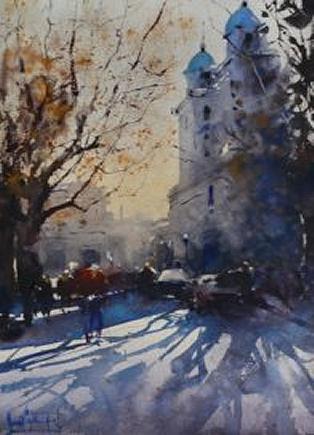Alxander Blok was the leading Symbolist and lyric poet of 20th century Russia, and for many Russians a worthy successor to Pushkin.
His first collection featured the recurring symbolic image of a beautiful lady who becomes the tortured countenance of suffering Russia. The mood darkened rapidly, and Blok's response to the traumatic events of 1905 and 1917 alternated between cautious hope and gloomy despair
He welcomed the Revolution but grew increasingly disillusioned, and, as his health and spirit suffered, retreated finally into silence.

More than most Symbolists, Blok managed to interweave life and poetry. He married young, became a celebrity, but indulged in affairs that broke the marriage and,
even before the Revolution, fell out of love with life. The later work is more mundane, balanced and open to
everyday feelings.
As usually interpreted, 'The Steps of the Commander' depicts Don Juan about to be slain by the stone statue invited into his house.
He dies repentant, however, discovering a higher vision in Donna Anna. {1} Nonetheless, Don Juan and Donna Anna are somewhat conflated a poem that has a threatening dream-like quality, stronger on atmosphere than clear narrative.
Шаги Командора
Тяжкий, плотный занавес у входа,
За ночным окном — туман.
Что теперь твоя постылая свобода,
Страх познавший Дон-Жуан?
Холодно и пусто в пышной спальне,
Слуги спят, и ночь глуха.
Из страны блаженной, незнакомой, дальней
Слышно пенье петуха.
Что́ изменнику блаженства звуки?
Миги жизни сочтены.
Донна Анна спит, скрестив на сердце руки,
Донна Анна видит сны…
Чьи черты жестокие застыли,
В зеркалах отражены?
Анна, Анна, сладко ль спать в могиле?
Сладко ль видеть неземные сны?
Жизнь пуста, безумна и бездонна!
Выходи на битву, старый рок!
И в ответ — победно и влюблённо —
В снежной мгле поёт рожок…
Пролетает, брызнув в ночь огнями,
Чёрный, тихий, как сова, мотор.
Тихими, тяжелыми шагами
В дом вступает Командор…
Настежь дверь. Из непомерной стужи,
Словно хриплый бой ночных часов —
Бой часов: «Ты звал меня на ужин.
Я пришел. А ты готов?..»
На вопрос жестокий нет ответа,
Нет ответа — тишина.
В пышной спальне страшно в час рассвета,
Слуги спят, и ночь бледна.
В час рассвета холодно и странно,
В час рассвета — ночь мутна.
Дева Света! Где ты, донна Анна?
Анна! Анна! — Тишина.
Только в грозном утреннем тумане
Бьют часы в последний раз:
Донна Анна в смертный час твой встанет
Анна встанет в смертный час.
1912
The TTS Audio Recording of the opening stanzas is:
The poem takes the form of ten stanzas in iambic measure and rhymed 5A4b6A4b, where the feminine rhyme is shown in upper case:
Тя́жкий, пло́тный за́навес у вхо́да, 5A
За ночны́м окно́м — тума́н. 4b
Что тепе́рь твоя́ посты́лая свобо́да, 6A
Страх позна́вший Дон-Жуан? 4b
Two renderings of Blok's Steps of the Commander are provided by Ruverses.
I give the first stanza of each:
A. Wachtel, I. Kutik and M. Denner
A thick, heavy curtain at the door,
Mist beyond the nighttime window.
Now that you know fear, Don Juan
What's your hateful freedom worth?
Cecil Maurice Bowra
On the door a thick and heavy curtain,
Through the window night mists peer.
What is left of all your hateful freedom,
Juan, now that you know fear?
Every major poet has a distinctive voice given by his or her themes and interests, choice of vocabulary and stanza forms. These we have
to carry over while still making the translation a working poem. Blok was exceptionally gifted and, as in this poem, could depict life's mundane and arbitrary events
in deeply musical verse. The 5464 form, the seeming artlessness of life, the repetition of events and tight rhyming all seem essential to the piece. Today's free verse can certainly
convey the mundane and seeming naivity of Blok's lines, but generally falls down on the other requirements.
I have nonetheless been forced to make a few departures from the Russian in this rendering.
Wachtel et al's 'Splashing light into the night, a car / Rushes by, as black and quiet as an owl' in stanza 6, is closer to the Russian than mine.
Something always has to be given up in verse translation, but this rendering is otherwise reasonably close.
A curtain, thick and heavy, fills the door,
and fog is pressing the window-pane.
A gross licentiousness, Don Juan: what's it for
when fear is coming, all too plain?
Silent the sumptuous, vast bedroom stays,
night holds its breath, the servants sleep.
And from a blissful, unfamiliar country strays
the day-break chorus roosters keep.
What’s bliss when gross deceit undoes your part,
when hours on earth are also gone?
Now Anna sleeps with arms tight-pressed about the heart:
Donna Anna's dreaming on.
And yet that face is frozen hard, a chill
with which reflecting mirrors gleam.
Does, Anna, sleep within the grave go well, and will
you, disembodied, also dream?
5. Life is crazed and empty, meaningless:
come out to fight its monstrous pride!
Enamoured and triumphant come the sounds that press
of horn from darkened snows outside
Headlights drench and vanish out of sight,
the car goes past as owl for mouse.
And now with steps that seem imperative and light,
the Commander strides toward the house.
The door will open to excessive cold,
nor clock be easy on the ear.
This is the hour your dinner invitation told.
Are you not ready? I am here.
There comes no answer to that probing why,
which in itself must tell the tale.
Here, over-rich, the rooms return a frightened cry:
the staff sleep on and night turns pale.
The night was cloudy, but the day dawns bright,
yet strangely chill that light becomes.
Where are you, Donna Anna, our blessed Queen of Light?
Anna! Anna! Nothing comes.
10. No morning’s veil of threatening fog denies
the coming of our final breath,
nor less will Donna Anna in that fateful hour arise
and hold you in that hour of death.
1. Bristol, E., A History of Russian Poetry (O.U.P. 1991) 191-96.
Russian poem translations on this site: listing.